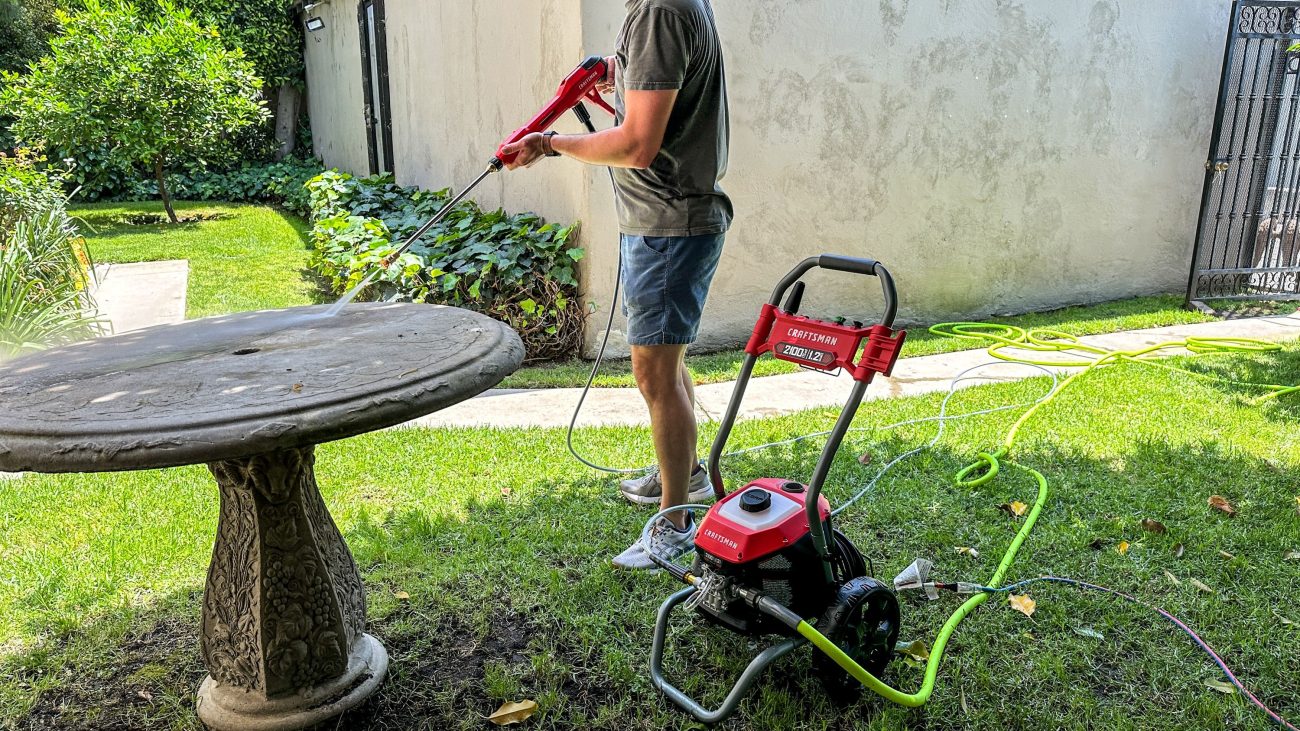 Hot water makes all the difference when it comes to tackling tough cleaning challenges, and when you combine that power with electric efficiency, you get an electric hot water pressure washer that revolutionizes how professionals approach commercial cleaning tasks. These innovative machines represent the perfect marriage of cleaning effectiveness and environmental responsibility, delivering the kind of results that cold water systems simply cannot match.
Hot water makes all the difference when it comes to tackling tough cleaning challenges, and when you combine that power with electric efficiency, you get an electric hot water pressure washer that revolutionizes how professionals approach commercial cleaning tasks. These innovative machines represent the perfect marriage of cleaning effectiveness and environmental responsibility, delivering the kind of results that cold water systems simply cannot match.
The fundamental advantage of an electric hot water pressure washer lies in its ability to break down grease, oil, and stubborn residues that would otherwise require excessive pressure or harsh chemicals. Hot water pressure washers excel at cleaning grease, washing away oils, disinfecting and sanitizing surfaces and de-icing facades, making them indispensable tools for restaurants, automotive shops, manufacturing facilities, and any business dealing with heavy-duty cleaning requirements.
Why Electric Hot Water Pressure Washers Outperform Cold Water Systems
The science behind hot water cleaning is straightforward yet powerful. When water temperature increases, molecular activity accelerates, allowing the heated water to penetrate and dissolve contaminants more effectively than cold water alone. An electric hot water pressure washer typically operates at temperatures between 140°F to 200°F, creating optimal conditions for breaking down organic matter, grease buildup, and sanitizing surfaces simultaneously.
Professional cleaning contractors report significant time savings when switching from cold water to hot water systems. The enhanced cleaning capability means fewer passes over the same surface, reduced chemical usage, and faster overall job completion. Hot water pressure washers require less pressure, clean faster and don’t use as much detergent, translating directly into improved operational efficiency and reduced chemical costs.
The temperature advantage becomes particularly evident when dealing with:
- Grease and oil removal from commercial kitchens and automotive facilities
- Sanitizing surfaces in food service and healthcare environments
- De-icing operations during winter maintenance
- Chewing gum removal from sidewalks and parking areas
- Heavy machinery cleaning in construction and manufacturing
Suggested read: The Ultimate Rinseless Wash Solution: How to Clean Your Car Anywhere Without Water
Electric vs Gas: Why Electric Hot Water Pressure Washers Lead the Market
The debate between electric and gas-powered cleaning equipment has evolved significantly, with electric systems gaining substantial ground due to technological advances and environmental considerations. Not only do they consume less water and energy, which reduces utility bills, but they are also generally more affordable than gas-powered models, making them attractive investments for businesses of all sizes.
Operating Cost Analysis
| Factor | Electric Hot Water | Gas Hot Water |
|---|---|---|
| Initial Purchase Cost | $2,500 – $8,000 | $4,000 – $12,000 |
| Monthly Operating Cost | $150 – $300 | $400 – $800 |
| Annual Maintenance | $200 – $500 | $800 – $1,500 |
| Environmental Impact | Minimal | Significant emissions |
| Noise Level | 60-70 dB | 85-95 dB |
Key Advantages of Electric Systems:
Lower Maintenance Requirements: Electric motors contain fewer moving parts compared to internal combustion engines, resulting in reduced wear and maintenance needs. There’s no need for oil changes, fuel system maintenance, or winterization procedures that gas units require.
Indoor Operation Capability: Unlike gas-powered units that produce dangerous emissions, an electric hot water pressure washer can safely operate in enclosed spaces, making them ideal for warehouse cleaning, indoor vehicle maintenance, and facility sanitization.
Consistent Performance: Electric motors deliver consistent power output regardless of ambient temperature or altitude, ensuring reliable performance across different operating conditions.
Reduced Operating Costs: With electricity typically costing less per BTU than gasoline or propane, electric units offer superior long-term value, especially for businesses with high-usage requirements.
Suggested read: Reducing Washer: Everything You Need to Know About This Essential Plumbing Component
Technical Specifications That Matter for Commercial Applications
Understanding the technical capabilities of an electric hot water pressure washer helps businesses select equipment that matches their specific cleaning requirements. The most critical specifications include pressure output (PSI), flow rate (GPM), and heating capacity.
Pressure Requirements by Application:
- Light commercial cleaning: 1,500 – 2,000 PSI
- Medium-duty operations: 2,000 – 3,000 PSI
- Heavy industrial cleaning: 3,000 – 4,000 PSI
- Specialized applications: 4,000+ PSI
Flow Rate Considerations:
Higher GPM ratings indicate greater water volume, which directly impacts cleaning speed and efficiency. Most commercial electric hot water units operate between 3-8 GPM, with higher flow rates suited for large-surface cleaning applications.
Heating System Performance:
Electric heating elements in commercial units typically range from 36kW to 108kW, capable of maintaining consistent water temperatures even during extended operation periods. Advanced systems include temperature monitoring and automatic adjustment features to optimize fuel efficiency.
Suggested read: Pan Washer: Everything You Need to Know About This Essential Plumbing Component
Industry Applications Where Electric Hot Water Pressure Washers Excel
The versatility of electric hot water pressure washer systems makes them valuable across numerous industries, each benefiting from the unique combination of heated water and electric efficiency.
Food Service Industry
Restaurants, commercial kitchens, and food processing facilities face stringent sanitation requirements that hot water cleaning addresses effectively. The high-temperature water not only removes grease and food residues but also provides sanitization benefits that cold water cannot match. Equipment cleaning, floor degreasing, and exhaust system maintenance become more efficient and thorough with hot water systems.
Automotive and Transportation
Vehicle maintenance facilities utilize hot water pressure washing for engine cleaning, undercarriage degreasing, and fleet washing operations. The heated water cuts through road grime, oil deposits, and salt accumulation more effectively than cold water alternatives, reducing cleaning time and improving results.
Manufacturing and Industrial
Heavy machinery cleaning, equipment maintenance, and facility sanitization benefit significantly from hot water pressure washing. Manufacturing environments dealing with hydraulic fluids, cutting oils, and industrial lubricants find that hot water systems remove these contaminants more completely, maintaining equipment performance and extending service life.
Healthcare and Institutional
Hospitals, schools, and public facilities require thorough sanitization protocols that hot water pressure washing supports. The combination of heated water and appropriate cleaning agents provides effective pathogen reduction while maintaining surface integrity.
Suggested read: ONR Wash: The Waterless Car Cleaning Revolution That's Changing Vehicle Care Forever
Advanced Features That Maximize Cleaning Efficiency
Modern electric hot water pressure washer systems incorporate sophisticated features designed to enhance performance, improve user safety, and reduce operational costs. Understanding these capabilities helps businesses maximize their equipment investment.
Variable Temperature Control: Advanced systems offer precise temperature adjustment, allowing operators to optimize water temperature for specific cleaning tasks. Lower temperatures conserve energy for light cleaning, while maximum heat settings tackle the most challenging applications.
Automatic Pressure Regulation: Smart pressure control systems automatically adjust output based on nozzle selection and cleaning requirements, preventing surface damage while maintaining optimal cleaning performance.
Integrated Chemical Injection: Built-in detergent systems provide precise chemical metering, ensuring consistent cleaning results while minimizing chemical waste and environmental impact.
Remote Monitoring Capabilities: Some commercial units include digital monitoring systems that track operating parameters, maintenance schedules, and performance metrics, supporting proactive maintenance and optimal efficiency.
Suggested read: Commercial Glass Washers: Why Your Business Needs Professional Glassware Cleaning Equipment
Safety Protocols and Best Practices for Hot Water Operations
Operating an electric hot water pressure washer requires understanding specific safety considerations related to high-temperature water and electrical systems. Proper training and safety protocols protect operators while ensuring optimal equipment performance.
Personal Protection Requirements:
- Heat-resistant gloves rated for temperatures above 200°F
- Safety eyewear with side protection
- Non-slip footwear with ankle protection
- Chemical-resistant clothing when using detergents
Operational Safety Guidelines:
Always allow equipment to cool down gradually after use, avoiding rapid temperature changes that can damage seals and components. Test water temperature before beginning cleaning operations, and maintain safe distances from cleaning surfaces to prevent hot water splash-back.
Electrical Safety Considerations:
Ensure proper grounding of all electrical connections, use GFCI-protected circuits in wet environments, and regularly inspect electrical cords and connections for damage or wear.
Suggested read: Embassy Wash: The Ultimate Solution for Professional Glass Cleaning and Detailing
Maintenance Strategies That Extend Equipment Life
Proper maintenance of an electric hot water pressure washer significantly impacts operational costs and equipment reliability. Implementing systematic maintenance procedures prevents costly repairs and ensures consistent performance.
Daily Maintenance Tasks:
- Check water temperature readings and heating element function
- Inspect high-pressure hoses and connections for leaks
- Verify proper detergent flow and mixing ratios
- Clean inlet screens and filters
Weekly Maintenance Procedures:
- Flush heating system with clean water to prevent mineral buildup
- Inspect and clean spray nozzles for optimal pattern and pressure
- Check electrical connections and motor housing for damage
- Test safety systems and emergency shutoffs
Monthly Comprehensive Inspections:
- Descale heating elements using manufacturer-approved procedures
- Replace worn seals and gaskets in pump assemblies
- Calibrate temperature and pressure monitoring systems
- Document performance metrics and maintenance activities
For businesses considering space-efficient options, a wall mount electric pressure washer provides excellent performance in compact installations while maintaining hot water capabilities.
Suggested read: Dr Wash: Transform Your Vehicle Care with Professional Auto Detailing Services
Cost-Benefit Analysis for Business Decision Making
Investing in an electric hot water pressure washer requires careful evaluation of total cost of ownership versus operational benefits. Understanding these financial implications helps businesses make informed equipment decisions.
Quantifiable Benefits:
- Labor Cost Reduction: Hot water cleaning reduces cleaning time by 30-50% compared to cold water methods
- Chemical Cost Savings: Reduced detergent usage typically saves $200-500 monthly for commercial operations
- Energy Efficiency: Electric heating systems operate at 95%+ efficiency compared to 80-85% for gas units
- Maintenance Savings: Lower maintenance requirements save $1,000-3,000 annually compared to gas systems
Return on Investment Timeline:
Most businesses recover their additional investment in electric hot water capability within 18-24 months through operational savings and improved cleaning efficiency. High-usage applications may achieve payback in 12-15 months.
Suggested read: The Complete Camper Wash Blueprint: Transform Your RV From Filthy to Sparkling in 2025
Environmental Impact and Sustainability Considerations
Environmental responsibility increasingly influences equipment purchasing decisions, making the sustainability benefits of electric hot water pressure washer systems particularly relevant for modern businesses.
Emission Reductions:
Electric systems produce zero direct emissions, supporting indoor air quality and reducing overall carbon footprint when powered by renewable energy sources. This advantage becomes particularly significant for businesses operating under strict environmental regulations.
Water Conservation:
Hot water pressure washers can also accommodate a large number of electric pressure washer accessories, from hoses and reels to a variety of specialized nozzles, wands and guns, enabling more efficient water usage through improved cleaning effectiveness and specialized application tools.
Chemical Reduction Benefits:
The enhanced cleaning power of hot water significantly reduces chemical requirements, supporting environmental stewardship while reducing chemical storage and disposal costs.
Suggested read: Best Boat Wash Solutions: How to Keep Your Vessel Spotless in 2025
Ready to Transform Your Cleaning Operations?
Investing in an electric hot water pressure washer represents a strategic decision that impacts operational efficiency, environmental responsibility, and long-term profitability. The combination of superior cleaning performance, reduced operating costs, and environmental benefits makes these systems essential tools for modern commercial operations.
Whether you’re managing a restaurant requiring thorough degreasing, an automotive facility needing effective parts cleaning, or a manufacturing operation demanding industrial-grade sanitization, the right electric hot water pressure washer delivers the performance and reliability your business demands.
Transform your cleaning operations today with professional-grade electric hot water pressure washing technology that delivers results while supporting your sustainability goals and operational efficiency objectives.
